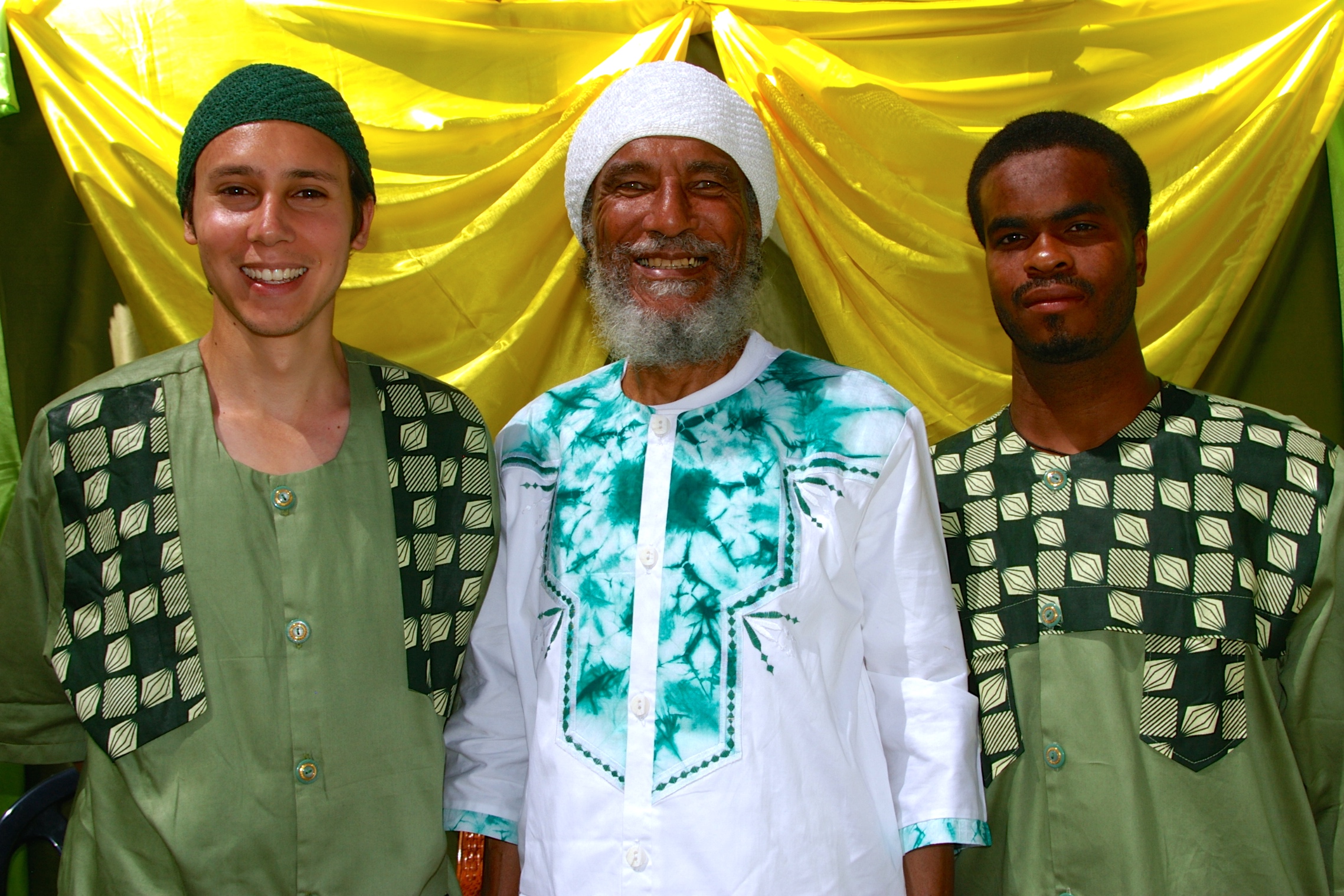By now, the news has traveled around the world that Ben Ammi Ben Israel, the spiritual leader of the African Hebrew Israelites, passed away on Saturday at the age of 75. I wrote an obituary for Haaretz but want to share a few personal recollections of him here.
When I first arrived in Dimona to begin researching the community in the fall of 2007, I was intimidated by this man known as “Abba Gadol” (Great Father) and “Ben Ammi HaMashiach” (the Messiah). He always carried a scepter and was escorted wherever he went by a security detail. He had a large head and piercing, green-grey eyes. His photo stared down at me from the walls of every house in the kefar (village). When he gave speeches, his fiery rhetoric alternately moved and unsettled me; he denounced the Western world, and especially the U.S., as corrupt and evil. He did not mince words.
But he was always kind to me. He called me by my community name—Nativyah—and referred to me once as “my beloved son.” He asked after my family in the U.S. He used to nag me, like a Jewish mother, about getting married. “I’m still waiting on that name,” he would say when he spotted me in the crowd at a community gathering. This meant that he was waiting for me to submit the name of my intended for his blessing.
Crucially, he allowed me to conduct my research freely and to participate in community life fully. He chose the family I was to live with for over a year, the family I still regularly call and write to. He permitted me to travel with a delegation of young saints to West Africa—my first trip to the continent. And he always (well, almost always) granted me interviews and answered my questions. For all of this and more, I am eternally grateful.
Ben Ammi was a holy man, an ascetic. He spent much of his time cooped up in his house, reading, writing, planning, praying, doing the things expected of “Yah’s representative on earth.” But he was also very human. He was competitive and liked to play chess and horseshoes. He ate his food very, very slowly, savoring every bite. (He said the chewing helped with digestion.) He loved watermelon and wanted to grow them in retirement. He smiled and laughed easily. He wept when the community’s soldiers saluted him during a ceremony.
He had many talents but, as all of the saints can attest, he was not blessed with rhythm. In preparation for the community’s annual “Dance for the Land” during Shavuot, he would rehearse his steps at the dance studio in the kefar for hours and hours. On the day of the Dance, he would perform his routine with a look of intense concentration on his face. I found this both humorous and poignant. He never backed down from a challenge.
He had his detractors, as all leaders do. But I believe that he genuinely loved his people, and he loved being loved by them. When I interviewed him for the first time in 2008, I asked him what was perhaps an unfair question: Do you know all 3,000 or so of your followers? He answered in stride [audio]:
I try to maintain a personal relationship with all of the saints. That’s my greatest pleasure, is being out in the midst of them. I always refer to those little ones, like we got a thousand of those little ones, like they’re three and four years old, and when I walk around they say, “Abba Gadol! Abba Gadol!” And I try to acknowledge each one, saying “Shalom,” because that’s me. I never want to be away from feeling a part of, in the midst of, my people. That’s why I live where I live [in the kefar]. I want to convey this message to them, for them to live in paradise, but I don’t want to be distant from them. I want to be right in the midst of them. So I try to maintain a personal relationship, as I can, with them. I want to know all of them, be able to go into their houses and to sit down and to share and have some tea with them. That’s my soul. I want to maintain forever that kind of relationship with all of the saints.
I also asked him, as delicately as possible, what would happen if he found himself unable to lead the community at some point in the future. Would he appoint a successor? He replied [audio]:
I’ve never considered it, and I feel that it would come again by divine revelation. I wasn’t an elected official, to guide my people, and possibly the same process by which I was chosen I just feel that this time, since I am in existence on this planet, that it would come through divine revelation to the Father as to who would be my successor. But at this point it has not come.
It is unclear if he received such a revelation before he “made transition,” as the saints say. Many saints believe that one of the nesikim (princes) will become the public face of the community without necessarily assuming the mantle of “messiah.” There are many questions at this point and few answers. But what is certain is that Ben Ammi’s name and legacy will continue to inspire many people around the world for years to come.
The last time I saw him was in mid-September. I flew to Israel to attend the wedding of my spiritual brother Zariyah (pictured above) and had requested a sitting with Ben Ammi while in town. I was not optimistic that he would oblige, given his health challenges. But, to my surprise, he summoned me—in the middle of the wedding ceremony. When the messiah calls, you go, so I walked over to his house. We sat together on the porch and chatted for about 10 minutes in Hebrew. He asked me where I was living and what I was doing. I asked about his health. He said he was doing better. He looked very thin, but his eyes were still bright. I told him I had some more questions for my research that I was hoping he would answer. He said he would, just send them along.
We embraced, he walked inside his house, and I returned to the wedding.


Very eye opening. Thanks for sharing.
I feel that this was very well written, personal and true to who he is. I can appreciate in your writing your ability to not compromise the truth, and yet still have point of view. Tasteful, well put, and nicely reminiscent.
Very nicely written Nativyah, I loved the audio excerpts as well!
yhc
Thanks for sharing,this brought back so many of my own very personal experiences and recollections of Abbah,along with tears of course.
Abbah has ascended physically,but without doubt infinitely remain present in those whose lives he touched ever so genuinely,gentky,charismatically,and intensity.
I his eternal servant Tieemeyah am forever indebted to him for all that he gas done for me and mine.
Rest infinitely and peacefully Ha Mashiahk,save a place for me wherever you are,I MISS AND LOVE YOU.
MAY YAH GRANT YOU PEACE.
This was so special. I enjoyed reading it. Todah for sharing m
Yah Kahi,
Reading this blog Nativyah, brought tears to my eyes for two reasons. One for the reason for this blog and the other is I never really had a chance to meet you. The things we take for granted. You always walked around with a smile never down. My friend love your blog. Thanks!
Thank you Nativiyah
You catch the True Essence of who he was! the Greatest Soul to walk this Earth!
Yes he truly love every soul and had a great concern for the welfare of his people! He gave of his self freely !
Todah for sharing. This is a wonderful special gift. I appreciate this poignant interview, especially the the audio portion, this is a special treat! Hearing H.E.’s voice…touches my soul, bringing out more gentle waves of tears and love. I am glad to hear his regular everyday svoice. YAHWAH KHS
His everyday speaking voice.
thank you
Todah Rabah for sharing such a personal story of the father! He will be greatly missed!!!!
#YAHKHAI #BENAMMIKHAI
This touched my soul so intently. I tried my best not to cry when I heard His voice…I did anyway. I had dreams to meet Abbah Ben Ammi once again, I was told I did when I was born there in Dimona and He named me but I don’t remember.Words can’t explain how much I will miss seeing His physical form but to NEVER forget that His spirit is Eternal. My prayers go out to all of His immediate family and His spiritual ( the saints and Leaders) including us over in Babylon. Todah so much for sharing this!
It would be a pleasure to meet you one day when I return back to Dimona.
We love You Abbah Ben Ammi!!! Yah Khai.
What a beautiful experience! Thank you for sharing. He was truly loved and revered by many. Looking forward to seeing the results from your research.
Shalom Ahkee Nativyah. Todah Yah Quadosh Yeesrael for Abba Ben Ammi HaMasheakh and todah Akh Nativyah for helping us “WRight ” this history. YAH Khia. YAH Khia. Abba Ben Ammi Khia.
That was simply beautiful, ahkee. Nothing I can add or take away. Just beautiful… Todah rabah!
itYAHfaot
Todah ahki, for sharing and as well as asking and recording those questions. Todah to the Holy Father for sharing his spirit and words with you, and as always not shying away but sharing truth. Let’s continue to be sons and daughters of our people.
Very beautifully written, thank you for your contribution to research and just history overall!!
Todah rabah for the Divine recorded spirit of abba gadol and I still read some portion of baba’s writing daily selah!!!